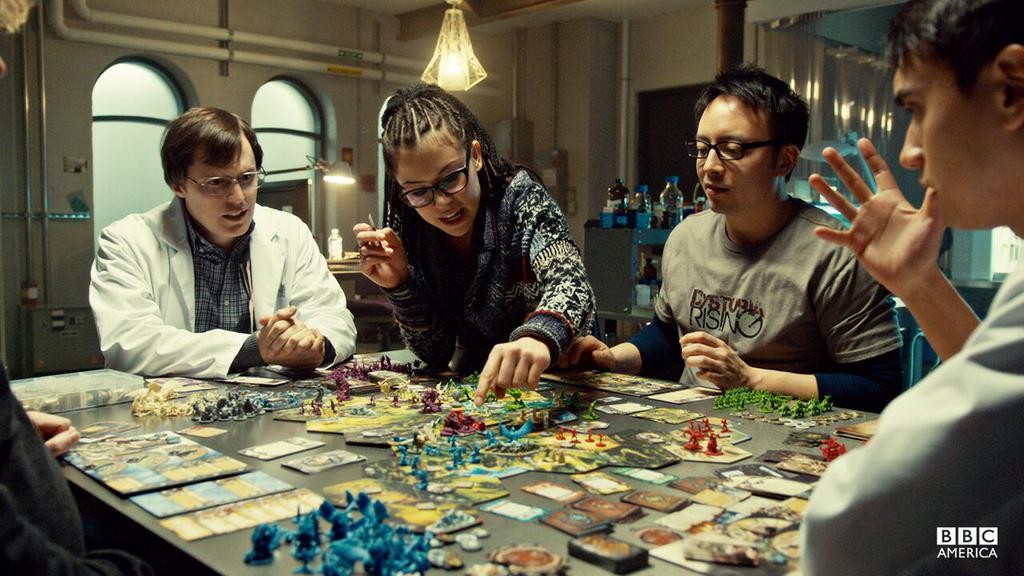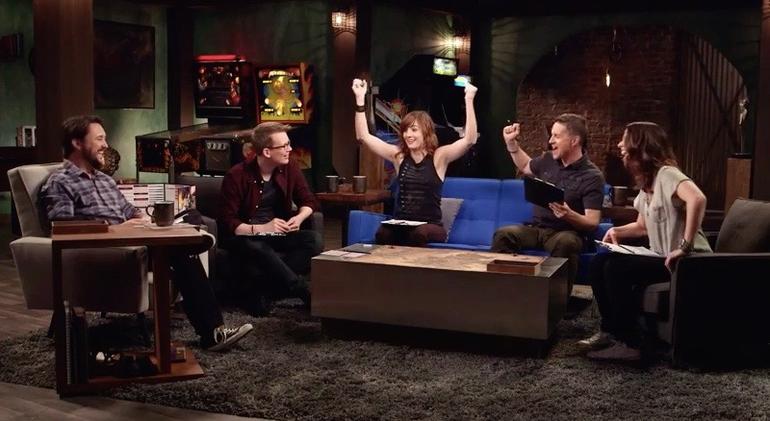Today, on #RPGaDAY, our writing prompt is Favorite Appearance of RPGs in the Media.
I can’t really think of any, or at least any that are positive. Either they’re played for jokes, or they’re present to show the players themselves are the jokes:
INT. SHELDON AND LEONARD’S APARTMENT. DAY.
PENNY
What have you guys got planned for the weekend?
SHELDON
We were going to play Dungeons & Dragons.
[audience laughter]
SHELDON
(holding up player’s handbook)
It’s Advanced.
[more audience laughter]
Boardgames have a better presence in television. Over on Orphan Black, Runewars from Fantasy Flight Games made an appearance late in season two, with members of Cosima’s lab playing. The showrunner is a fan of the game, coordinated with FFG’s president, and went over the script with the actors to make sure they actually were (seemingly) playing the game. In season three ((I haven’t caught up yet. No spoilers, please.)), more FFG games show up. Carcassone, Settlers of Catan, and other gateway games have been seen on other recent television shows. And that’s not counting things like Geek & Sundry’s Tabletop or the celebrity game night thing that came out on network television right after Tabletop became an internet sensation.
It’s a golden age for boardgames, but we’re not seeing that with role-playing games. The closest we’ve gotten are on the Geek & Sundry shows Tabletop and Titansgrave. Over on Tabletop, they ran Dragon Age and Fiasco ((While the Fiasco episode was good, I think it’s better to compare the other two.)) ; Titansgrave was a campaign-length show that featured Fantasy AGE, based on the game that powered the Dragon Age game. But readers of this blog are probably aware of those.
 That Dragon Age episode, I particularly didn’t like. It’s an awesome example of what happens when you don’t have a social contract or good buy-in to the game you’re about to play. Pramas brings a dark fantasy game, Hardwick wants to play goofy fun dorkiness, and Wheaton just wants to have fun with his friends. After Hardwick describes his character as Fonzie, whose goal is to sleep with every woman in the setting, there’s a cut to Pramas diplomatically talking about how every group has a player like this. ((Which is complete BS, but this is a show, so rather than scream out in frustration, Chris Pramas takes the high road.)) It’s an amazingly awful start to an episode that several people believe is a good example of gaming. When I mentioned this on Google Plus, one of the responses was, “it felt like Hardwick was mocking my favorite hobby. It really was not fun to watch.” I agree.
That Dragon Age episode, I particularly didn’t like. It’s an awesome example of what happens when you don’t have a social contract or good buy-in to the game you’re about to play. Pramas brings a dark fantasy game, Hardwick wants to play goofy fun dorkiness, and Wheaton just wants to have fun with his friends. After Hardwick describes his character as Fonzie, whose goal is to sleep with every woman in the setting, there’s a cut to Pramas diplomatically talking about how every group has a player like this. ((Which is complete BS, but this is a show, so rather than scream out in frustration, Chris Pramas takes the high road.)) It’s an amazingly awful start to an episode that several people believe is a good example of gaming. When I mentioned this on Google Plus, one of the responses was, “it felt like Hardwick was mocking my favorite hobby. It really was not fun to watch.” I agree.
No, the better example of gaming is the Titansgrave series, where Wil Wheaton runs a game that lasts ten episodes. ((Chris Pramas and the rest of Green Ronin were on staff to facilitate.)) There, everyone is on the same page ((Except the opening narrator, who seems to think there’s all this Foreboding and Darkness, when the game they’re actually playing is all about THE BEER!, robotic NPCs named “Keggy”, and general light goofiness in the foreground.)) and it’s a great representation of role-playing games to people who haven’t played them before. The campaign book (and the base Fantasy AGE game) sold like crazy at Gen Con 2015. I’ve heard and read so many people talk about that game and how much they’ve enjoyed the setting. I’ve got nothing but goodness to talk about that series. It’s going to be something that brings more gamers into the hobby.



